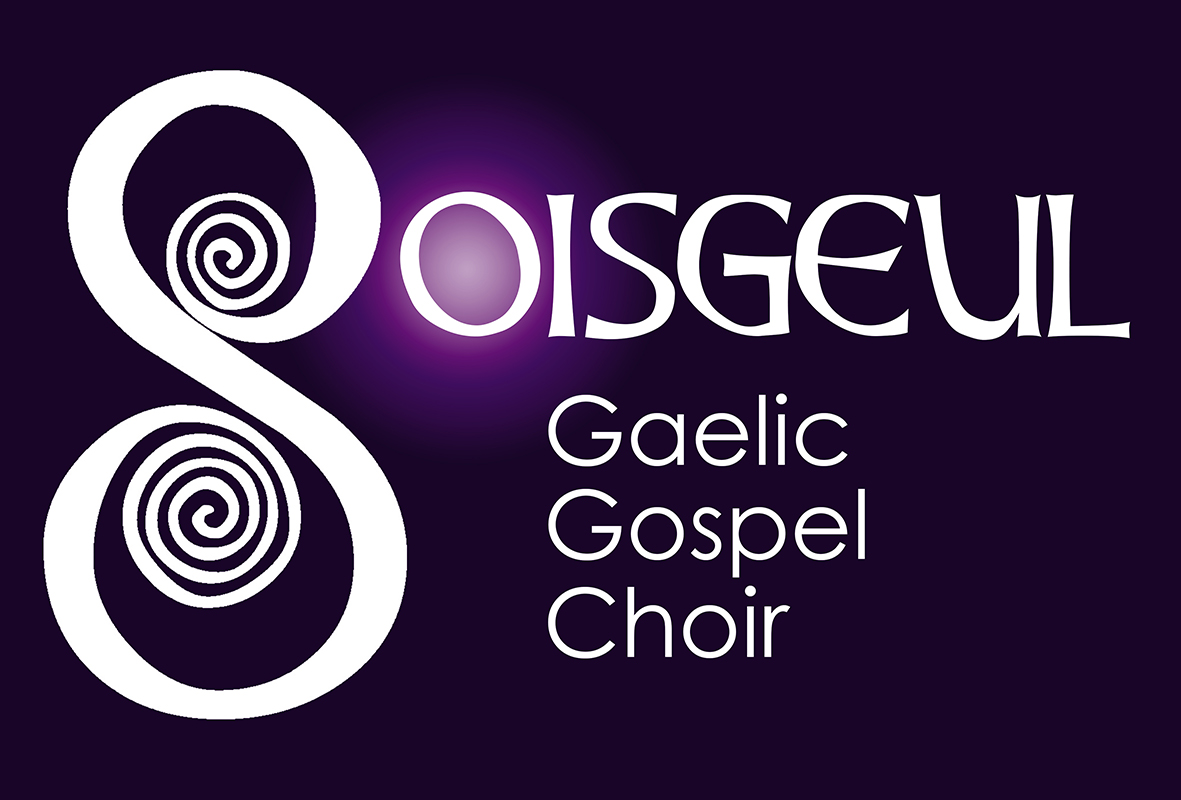Latest news
Solas Festival, 2015
Iona Abbey, 2017
Usher Hall, 2019
Celtic Praise,
Royal National Mòd, 2019
Soisgeul
’S e còisir Albanach a th’ ann an Soisgeul, le ballrachd bho air feadh na dùthcha, fosgailte do sheinneadair sam bith aig a bheil ùidh ann an seinn Gàidhlig chòisirean, agus gu seachd àraid a’ coimhead air òrain spioradail agus Soisgeulach. Tha a’ chòisir a’ tighinn cruinn aig deifir amannan dhen bhliadhna agus ann an deifir cheàrnaidhean de dh’Alba airson ceòl a dheasachadh do chuirmean leithid fèis Solas ann an siorrachd Pheairt, seinn an Abaid Ìdhe, seirbhis Nollaig BBC ALBA, agus cur-air-làr àraid aig a’ Mhòd Nàiseanta. Tha a’ chòisir an-dràsta fo stiùir seinneadair is sgrìobhaiche ainmeil, Màiri Anna NicUalraig, agus tha dlùth dhàimh cuideachd aig a’ chòisir ris an stiùiriche chòisirean Soisgeulach, Gareth Fuller.
Soisgeul is a nationwide choir, with membership open to all singers with an interest in Gaelic choral singing and a focus on spiritual and Gospel songs. The choir gathers through the year in locations across Scotland to rehearse material for performances that have ranged from an appearance at Solas festival in Perthshire, singing in Iona Abbey, the BBC ALBA televised Christmas service and a showcase at the Royal National Mòd. The choir’s current Musical Director is acclaimed musician and composer, Mary Ann Kennedy, and the choir also has a strong association with renowned Gospel Choir Director, Gareth Fuller.
Eachdraidh Soisgeul – Soisgeul’s Story
Chan eil càil ann as fheàrr le seinneadairean Gàidhlig na bhi togail an guthan còmhla! Disathairne a’ Mhòid, bi na còisirean sgìreil uile a’ tighinn cruinn airson gàirdeachas a dhèanamh agus soraidh slàn fhàgail dha chèile; bi mòran sheinneadairean a’ dol dhan fhèill Phan-Ceilteach an Èirinn, co-dhiù mar phàirt de chòisir steidhichte no mar bhuidhinn neo-fhoirmeil; agus chunnacas iomadh ceum adhartach thar nam bliadhnaichean, leithid chuirmean Talla Usher anns na 1990an agus ‘Lasair Dhè’, nua-chruth nan salm Gàidhlig le Màiri Anna NicUalraig. Thuige seo ge-tà, cha robh còisir ‘nàiseanta’ ann, a dh’aindheoin mòran deasbaid.
Tha iomadh freumh ann an ceòl nan còisirean Gàidhlig, ged as e cridhe gnothaich cànan is òrain Gàidhlig. A-measg nan nòsan ciùil a thug buaidh, tha ceòl traidiseanta agus folk, ceòl tùsanach agus clasaigeach an Saoghal an Iar, agus stoidhlichean eile leithid jazz agus roc. Chaidh cuideachd rannsachadh a dhèanamh an Alba agus ’s na Stàitean air ceangalan eadar seinn nan salm Gàidhlig agus an t-adhradh-ciùil aig cridhe ceòl dubh an là ’n-diugh.
B’ e ceum innleachdach a bh’ ann leis a sin, Soisgeul ga chur air bhonn ann an 2015 – cothrom-cruinneachaidh neo-phàirteil do sheinneadairean, co-dhiù tha iad cheana ann an còisir gus nach eil, airson rud ùr a chruthachadh a tha a’ ceangal ri saoghalan ciùil eile, agus cothrom a bhi anns an toiseach ann a bhi lorg slighean ùra airson ciùil Gàidhlig.
Gaelic singers just love to sing together! ‘Mòd Saturday’ sees all the regional Gaelic choirs come together to celebrate and sing farewell; many choristers participate in Ireland’s Pan-Celtic festival in various formal and informal groups; and there have been many ground-breaking events including the 1990s Usher Hall concerts and Mary Ann Kennedy’s reimagining of the Gaelic psalms – Lasair Dhè. Until now, however, there has been no nationwide choir, despite much debate.
Gaelic choral music is really a broad collection of influences, rooted in the Gaelic language and with song at its heart. This includes traditional and folk music, indigenous and Western classical music, and other genres including jazz and rock. There’s also been exploration in Scotland and the US into connections between Presbyterian psalm-singing and worship forms at the roots of contemporary black music.
The formation of Soisgeul in 2015 was an exciting new step for Gaelic choristers – ‘neutral territory’ for choristers (and non-choristers) to create something different that connects with other major musical worlds, and a chance to lead the way in exploring new territory for Gaelic music.






